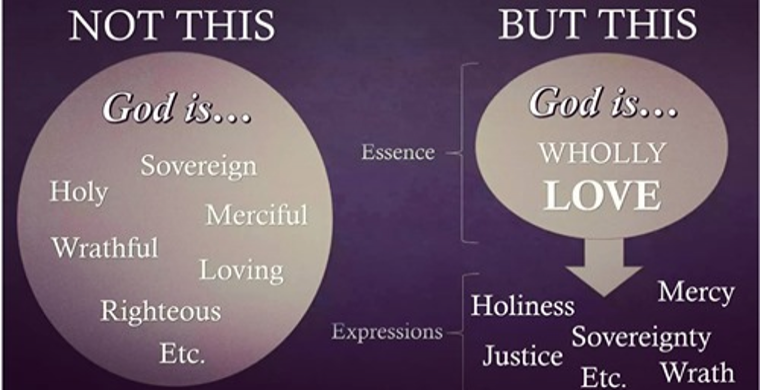"God Is Love." Yes, and--
By John Stackhouse
http://www.johnstackhouse.com/
September 6, 2020
An influential pastor recently posted this graphic on Facebook to strong acclaim from his followers. See above.
This way of describing God is very popular, of course. It's always been popular in certain circles, and it is increasingly popular on the leftward edge of evangelicalism.
But it's wrong.
How wrong?
It won't pass the test of even a single book of the Bible: I John.
I John is the source for the oft-cited phrase: "God is love" (I John 4:8). The author likes that phrase enough to repeat it later in the same passage (v 16).
It is one of the few phrases in the Bible set up as a copula: "God is X." So it's attractive to those trying to answer the big question of the nature of God: "Let's see if the Bible anywhere gives us a straightforward answer to the question, 'What is God?' Ah! Here's a place."
So far, then, so good.
But in the very same epistle we encounter a parallel construction: "God is light" (I John 1:5). Let's see it in context:
"This is the message we have heard from him and proclaim to you, that God is light and in him there is no darkness at all. If we say that we have fellowship with him while we are walking in darkness, we lie and do not do what is true."
Clearly we are in the ethical realm here and the author is warning his auditors--and just a few verses in!--that God is holy. God is morally pure. God is light, and if you say you are God's but walk in darkness, you clearly lie.
The epistle goes on almost immediately to promise that God has made a way for sinners to repent, be forgiven, and enjoy restoration to the fellowship of light. But the main point remains: God is holy and expects holiness from God's people.
Indeed, John's emphasis upon love in the rest of the epistle is hortatory more than it is reassuring. John constantly repeats, in a variety of ways, the basic concept that if you say you believe in the God who is both light and love, then you have to act accordingly.
Again, God lovingly will restore you as you fail in attempts at living a godly life. But you had better not assume that because God is love, you can do as you please. God is light and expects you to walk in the light--which entails loving your neighbour as well as God, and thus (as Jesus said) fulfilling the whole Law.
So John himself, author of "God is love," doesn't anywhere say that God's essence is only love. In fact, he couldn't be more plain that he doesn't think that, since he leads with "God is light."
I recognize why my friend wants to emphasize God's love. He and his church are in explicit reaction against a mode of Christianity they find legalistic, heartless, and grindingly demanding. They are reacting, as they should, against Christianity reduced to mere moralism: Do this, don't do that, and God will check off your actions on God's Big List and see if you get a passing grade.
Reactions, however, tend to the other extreme. And if over-emphasizing God's holiness can issue in moralism, over-emphasizing God's love historically has resulted in moral slackness and self-indulgence, since God's such a nice guy he won't mind if I . . .
The Bible simply doesn't put one trait of God over against the others. God is what God is all the time and in every way. Notice how the prophets and the apostles weave God's various traits--not just God's holiness and love, but also God's power and God's creativity--into braids of celebration and warning. They don't say that God is primarily love and everything else follows from that.
Moreover, you can't derive these other traits from the bare idea of love. (I've heard preachers and seen theologians try, and the result is very quickly a conceptual mess.) What kind of love one encounters in God is indeed shaped by all the other things God is. Indeed, I cannot think of a single Bible passage that is constructed thus: "Because God is love, God is also A, B, and C."
There is much more to say about all this, of course, which is why we have a very large Bible instead of a very small epistle to work with. But people who say, as my friend the influential pastor is saying, that God's essence is love and God's other traits somehow derive from that aren't getting right even the "ur-text" of their claim: I John.
Einstein is supposed to have said, "Simplify as far as possible, but no farther." It's good teaching to try to list the many wonderful things the Bible depicts of God and claims of God. And it's good teaching to try to show their relationship with each other, as on this graphic.
It's just that the simplification here went one step too far. Too far even for I John.














